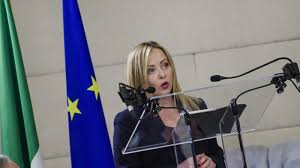NATO chief’s remarks on Ukraine strikes spark political tensions in Italy

Rome: Secretary General Stoltenberg calls for allies to allow Kyiv to use supplied weapons against Russian targets. Following criticisms within the government, PM Meloni urges prudence and labels as “irresponsible” those perpetuating the alarming narrative of a Europe on the brink of a broad conflict. According to Fabrizio Coticchia, a political science professor at the University of Genoa, the Italian government’s stance reflects “continuity with the past, characterised by prudence and attention to public opinion

Hit them at home. In an interview with The Economist, NATO Secretary General Jens Stoltenberg urged allies to lift restrictions on the use of weapons supplied to Ukraine for attacking military targets inside Russia. This option, requested by the Ukrainians, has been repeatedly blocked by NATO members.
This statement came after the New York Times reported that the US administration was considering easing restrictions on striking Russian targets within Russian territory. Media reported that Ukraine was discussing the matter with Western counterparts.
The reactions. Stoltenberg’s words entered the political debate, with the Italian Deputy Prime Minister and Transport Minister Matteo Salvini expressing his disagreement with the NATO Secretary General’s position.
“Italy is not at war with anyone, and if it was right to help Ukraine militarily, then it is also necessary to prohibit Kyiv from striking military targets in Russia,” he said. Salvini also called on Stoltenberg to either apologise or resign.
Deputy Prime Minister and Foreign Minister Antonio Tajani also commented on Stoltenberg’s words, urging allies, including Salvini, to make a “collective decision” on the matter and noting that the military equipment sent by Italy was being used inside Ukraine.
Tajani’s words were echoed by Defence Minister Guido Crosetto, who pointed out that NATO’s decision-makers are the member states and that a collective approach must be maintained.
In Giorgia Meloni’s (ultimate) words. “I believe that we must be prudent, but I also believe that it is right for NATO to remain firm,” the Prime Minister said on Sunday. The “alarming tale of a Europe on the brink of a broad conflict” is “counterproductive,” Meloni added. Those who feed this narrative are “irresponsible.”
“Deterrence is the only remedy; if we speak of a diplomatic route, it is because up to now, we have maintained a balance of forces,” the PM added, recalling the Latin motto “If you want peace, prepare for war.”
Professor Coticchia’s comments. According to Fabrizio Coticchia, a professor of political science at the University of Genoa, the Italian government’s stance is in “continuity with the past, consisting of prudence and attention to public opinion.” As the professor explains, this means support for the demands of Ukraine and its allies (sanctions and aid, albeit limited) but with a low profile and rhetoric focused on diplomatic efforts and opposition to the risks of escalation.
Indeed, Italy recently announced the ninth military assistance package to Ukraine, following the long-term security agreement signed with Ukraine in February to help the country strengthen its defences, support its defence industry and counter hybrid threats.
Lorenzo Cesa, chairman of the Italian Parliament’s delegation to the NATO Parliamentary Assembly, told our sister company that the NATO secretary’s proposal would rebalance the ground forces currently skewed towards Russia.
Stressing the political realism, Cesa concluded: “Italy, like all other NATO countries, must fulfil its commitments to send aid and weapons through bilateral agreements. This should not only be done by Italy, but also by all other countries. Only in this way can we hope to find a solution.”
Elections and Realpolitik. In the run-up to the European elections in June, the self-declared pacifist front led by the 5-Star Movement, led by former Prime Minister Giuseppe Conte, is very vocal in its opposition to military supplies to Ukraine.
In this environment, Conte is trying to gain space in opposition by exploiting the silence of the Democratic Party, led by Elly Schlein. In the European elections, they ran candidates who were both staunchly Atlanticist and pro-Ukraine and “pacifist” figures.





